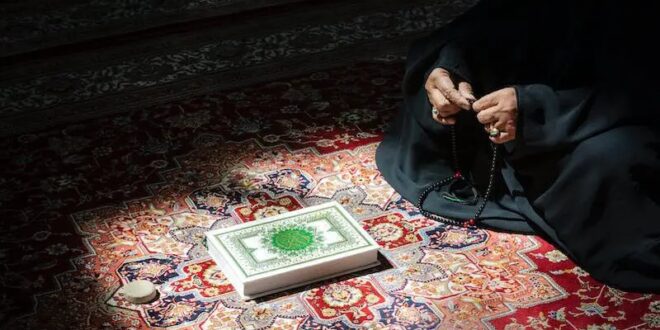In December the U.S. State Department for the first time placed Azerbaijan on its Special Watch List for “engaging in or tolerating severe violations of religious freedom.”
The U.S. Commission on International Religious Freedom (USCIRF) reported an uptick in the suppression of religious freedoms and an intensification of persecution targeting Muslim communities, with 19 individuals reportedly jailed for their faith in the preceding year.
The Azerbaijani government strongly contested this classification, with its State Committee on Work with Religious Institutions claiming bias in the report, accusing it of reliance on sources favoring Armenia and spreading misleading narratives.
This was further compounded when the Parliamentary Assembly of the Council of Europe (PACE) withheld ratification of the credentials for the Azerbaijani parliamentary delegation, pointing to the violation of religious freedoms among its concerns, leading to accusations from Azerbaijani officials of “Azerbaijanophobia” and “Islamophobia.”
In fact, the trajectory of Azerbaijan’s religious policy has markedly shifted from the relative openness of the 1990s to a regime of increasingly harsh regulations since the early 2000s. What began as mild regulatory measures evolved into stringent repression, with each legislative amendment over the past two decades curtailing ever more religious freedoms.
Notably, these legislative changes were enacted without public consultation, contributing to a pervasive censorship regime. This includes prohibitions on public prayer outside mosques, the closure of places of worship, the imprisonment of religious individuals, and the penalization of conscientious objectors to military service. Such measures have disproportionately impacted Shia activists, highlighting a trend where religious figures frequently constitute a significant portion of the country’s political prisoners.
The ruling elite has leveraged the bogeyman of Islamic extremism to cast itself as the guardian of a secular and stable Azerbaijani state to rationalize the adoption of more autocratic policies both domestically and internationally.
The 2020 Second Karabakh War not only saw Azerbaijan’s military triumph. It also ushered in an era of tighter controls on civil liberties, affecting hundreds, possibly thousands, within the Shia community. This period also saw strained relations with Iran, with arrests often portrayed as dismantling Iranian espionage networks.
Yet, many of those detained were charged with drug trafficking—a bogus charge commonly leveraged to suppress dissent in Azerbaijan—particularly in the aftermath of a deadly attackat the Azerbaijani embassy in Tehran in January 2023. The government’s response has mirrored the U.S.’s “Global War on Terror” post-9/11 rhetoric, employing it as a political tool to cast perceived threats as justifications for authoritarian practices, with little independent oversight to verify these charges. Essentially, “not a threat for what it is, but a threat for what it represents.”
It’s undeniable that Azerbaijan’s strategic geographical position exposes it to diverse influences from the Islamic world, including those from the Arab Gulf States, Russia’s North Caucasus, Turkey, and Iran. Such a position could theoretically make it susceptible to infiltration by foreign intelligence services, including Iranian ones, amid escalating bilateral tensions.
Nevertheless, the extensive nature of recent government crackdowns, which have notably exceeded the scope of the 2016 Nardaran incident – where around 90 Shia activists were arrested – raises serious concerns. The frequent levying of dubious drug trafficking charges against detainees, within the context of Azerbaijan’s autocratic governance structure, indicates a broader trend of repression. This pattern mirrors the suppression tactics used against the remnants of the independent press, civil society activists, and protestors.
The government’s approach to dealing with dissent or any form of opposition, such as the protests by residents of the village of Soyudlu against mining activities or the actions of independent media outlets like Abzas Media, often involves labeling these groups as agents of foreign powers. Similarly, Shia individuals detained under questionable charges are portrayed as a “fifth column,” ostensibly undermining the state.
This method is deliberately used by the authorities to redirect the national conversation from the democratization discourse to issues of ethnic politics and religion, areas where a broad consensus exists within the country, spanning even the opposition’s ideological spectrum. By doing so, the government effectively mutes dissenting voices, preserving the existing political order and deflecting focus from the state’s shortcomings and pressing domestic issues.
Repressions, especially within a religious framework, often do not quell mobilization but instead can invigorate the collective identity and activism of movements when they are targeted by the state as adversaries.
In Azerbaijan, such a strategy, marked by extensive arrests and the securitization of an entire community, inadvertently makes the country more prone to external influence. The Iran-based Huseyniyyun group, advocating for a theocratic state, has gained noticeable momentum in the last four years, voicing social and religious grievances.
While President Aliyev’s strengthened legitimacy following the Karabakh victory and the country’s stable security situation potentially curbing the group’s immediate impact, rendering it more of a phenomenon within social media circles, its potential to galvanize certain segments of the populace should not be underestimated.
 Eurasia Press & News
Eurasia Press & News




